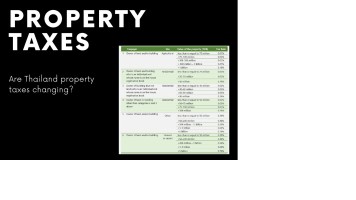Are Thailand property Taxes changing?

Thailand Property Taxes are Changing
Question: I’m looking to purchase a property in Thailand. I heard they might be adding an annual property tax or changing Thailand's property taxes. Is this true?
Answer: After numerous attempts over the years to reshape the way tax is imposed on property in Thailand, new property tax legislation has finally entered into law. The answer is yes, Thailand's property taxes are changing.
It should be noted that they will be slow to roll out the annual property taxes due to limited manpower. It has been proposed that the collections be done by the local subdistrict administrative organization for each sub-district.
This will become effective in the tax year of 2020 and it is the first land and building tax to be introduced in Thailand. The new Land & Buildings Tax Act of 2019 aims to encourage the productive use of land and improve tax collections on Thailand property along with decreasing income disparity.
Taxable Properties
The tax will apply to land, buildings, and condominium units. Any construction that can be used as a residence or for storage, industrial, or commercial purposes will also fall under the new tax code.
Owners will now potentially be liable to taxation on their Thailand property, although a generous tax exemption threshold will apply. The tax will be imposed on property held on 1 January of each tax year.
To be more specific regarding what is taxable:
- Land: Grounds that include areas that are hills and waterways (rivers and the sea are not considered land).
- Buildings: Houses, buildings, boathouses, or other constructions that are habitable or utilizable, used as storage, or used for industrial or commercial purposes.
- Condominiums: Condominium units to which the title document has been assigned under the Condominium Act.
The Thai government says that these new terminologies will solve any inconsistent interpretations by owners or relevant authorities of what defines a "property".
Tax Base
Under the new law, the tax base shall be the appraised value of the property at the Thailand Land Office as determined for the purpose of collecting registration fees under the Land Code. In the case where there is no appraised value, the tax base will be calculated in accordance with the criteria, method, and conditions as prescribed in Ministerial Regulations.
The new appraisal values under the Property Appraisal Act have not been issued. Therefore, the previous appraisal values, which applied before the enactment will remain in use. The new appraisal values are set to be issued within 2 years.
It is anticipated that the new appraisal values under the Property Appraisal Act could be higher than the previous appraisal values, or even equivalent to the market value.
Tax Rates
The following are ceiling rates, the maximum that can be charged in one calendar tax year.
They have been introduced into four categories for Thailand property taxes:
1) Properties used for agricultural purposes: 0.15% (maximum)
2) Properties used for residential purposes: 0.30% (maximum)
3) Properties used for purposes other than (1)and (2): 1.20% (maximum)
4) Vacant/non-utilized properties*: 1.20% (maximum)
Thailand property taxes and rates after 2022 shall be prescribed by Royal Decree. The local authority empowered to collect the tax has the power to impose a higher rate but in any case, it shall not exceed these ceiling rates.
Thailand's property tax rates on condominiums have been announced for the first tax year of 2020. For example, a condominium unit is owned by an individual that uses the unit as their place of residence and their name appears in the house registration book.
Land Tax Rates for Vacant Plots:
*** If the land or building is left vacant or undeveloped for three consecutive years, the rate will increase by 0.3% every 3 years subject to a cap of 3%.
Tax Exemptions
Tax exemptions and tax relaxations will be provided. Following the implementation of the Act, both individuals and corporate taxpayers who hold real estate, whether commercially or non-commercially will be affected. Therefore, the government has provided short-term tax relaxations and long-term tax exemptions, benefits, and exemptions for different scenarios as follows:
Short-term Relaxation
- Low applicable tax rates (the tax year 2020-21) to minimize the burden for taxpayers.
- Three-year tax relaxation for current property taxpayers. For the tax year, 2020-22 the Act provides a tax relaxation for a property that has been subject to property tax.
- Full tax exemption for owners of agricultural properties. These properties will not be subject to land and building tax for the tax years 2020-23.
Long-term Exemption for Primary Residence Property
- A tax-exempt threshold of Baht 50 million shall apply to land and buildings owned by individuals that are used as their place of residence, if their names appear in the house registration book on 1 January of the tax year.
- A tax-exempt threshold of Baht 10 million shall apply to buildings owned by individuals, where they are not the landowner, that are used as their place of residence.
Transitional Relief
In the first three years that the new tax on property in Thailand is collected, if the tax assessed is higher than the tax previously payable under the House and Land Tax Act, the taxpayer shall be liable to pay the house and land tax amount plus a portion of the excess in each year, being 25% in the first year, 50% in the second and 75% in the third year.
The Due Date for Tax Payment
In December 2019, a number of time extensions were announced in respect of the implementation of the new Thailand property law in 2020. Instead of tax assessments being issued to taxpayers in February 2020 for payment in April 2020, they will now be issued in June 2020 and tax payments will be due in August 2020.

